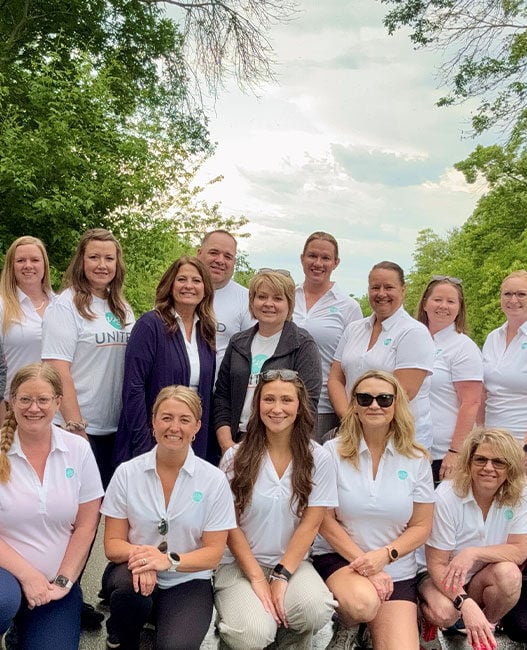This article originally appeared in the August’22 magazine issue of Electronic Specifier Design – see ES’s Magazine Archives for more featured publications.
Susan now has 30 years of experience in UK manufacturing and industrial environments. Her first role at SolutionsPT was as a Business Unit Manager of the AVEVA UK & Ireland division, formerly Wonderware UK & Ireland. She was promoted to general manager back in 2016, assuming full responsibility for all SolutionsPT operations.
Prior to joining SolutionsPT, Susan worked with global suppliers and manufacturers of high-tech products for the education market. This experience gave her an insight into the challenges faced by manufacturers and also the barriers to introducing digital technology to a new market. She also saw first hand many of the blockers that exist when it comes to education and STEM topics, particularly around encouraging the next generation of women to join the technical workforce.
Electronic Specifier’s Paige West spoke to Susan about her career, her experience as a woman in this field and her insight into the barriers surrounding STEM education.
Why did you decide to pursue a career in this field?
I actually fell into technology and engineering by accident, and I will admit I wasn’t overly into the subject as a child! But I do come from a long line of engineers and only later in life have I come to fully appreciate the immense importance of the industrial sector to society – something that should really be instilled in all young people from an early age. Many of my school friends in the US went on to study STEM subjects as it seemed an exciting career path for women but relatively few of them are still working in the industry, which I think is a sad thing.
What has been your experience as a woman in this field?
I have been very lucky to work in environments that separate themselves from outdated gender roles and have embraced and encouraged diversity and have been willing to invest in my development and future – but I understand that this isn’t the common experience for women in STEM.
I would not be where I am today if my past employers had not supported my MBA education or taken a chance on someone who did not have engineering or technical qualifications. In fact, many of our best technical experts – of any gender – at SolutionsPT have not had a formal background in technology or engineering. We have trained and developed them to create the expertise that we need.
Women that have an interest in STEM topics really just need to be given that chance and to have organisations believe in them.
Could you name a few challenges (or obstacles) you think women in this field face?
The societal pressures surrounding women in STEM topics is a major obstacle that must be addressed at all levels. While we have come far as a society in breaking down gender barriers, there are still archaic ideas that exist and can easily influence career decisions. It’s hard when you are the only woman in the room, or you don’t see role models that you identify with, either in the company you’re working in or in the wider media.
There is also a problem in our industry that many organisations and roles are simply not family friendly and insist on a high stress, long hour culture. This needs to change as it is simply not healthy or sustainable for any length of time for either men or women. I think we are starting to see that change, especially with the increase of flexible working brought on by the pandemic.
Why do you feel that there are so few women in this field?
I think it takes time and a lot of determination to redress an imbalance so deeply ingrained in society, but I do think it is possible. We need role models! We need an education pathway that girls and boys both find appealing – since the issue is not only one of balance but of numbers. We need that to be flexible, so kids aren’t forced down an education path too soon in their lives.
Engineering, at least here in the UK, also needs to be seen as the highly skilled, well-paid profession that it is.
I believe things are starting to change but for many years our brightest and best have been encouraged to become doctors, lawyers, or investment bankers, not engineers. I have the great pleasure of seeing and experiencing first hand many of the fantastic engineering companies in the UK at work and meeting the inspiring men and women who maintain the fine British heritage in our field. I can assure any readers that UK engineering is full of potential, and full of interesting and fulfilling careers and opportunities for men and women. In fact, I think the digital era offers immense promise to the UK and I’m really proud to lead a company dedicated to its success, and one which exemplifies what is possible when we invest in human, machine, and digital capital.
I understand that SolutionsPT is supporting primary schools in Manchester to increase awareness of engineering among teachers and their pupils. Are you involved in this project, and if so, how? Also, why do you feel this project is so important?
Primary Engineer is a very important partner organisation for us as it works closely with educators and organisations to inspire the next generation of the industrial workforce.
I am particularly keen to champion class opportunities and do my bit to encourage girls to consider an engineering career, and, perhaps more importantly, demonstrate to boys from a young age that women can play a part in the sector.
We need to find ways to not only get women and young girls excited by STEM but to get them to stick with it throughout their education and careers.
At a young age, the interest in STEM topics is perfectly level between boys and girls. It’s only later in life that it becomes a more maledominated area. What must change is how women are supported from school into the workforce, and how we communicate what a fulfilling and rewarding career path STEM subjects open up. We need to help young people to overcome the societal pressures that so many women in technology have faced, and not lose their interest in engineering, in making things, fixing things, improving things, and bringing their ideas, backgrounds and viewpoints into our field.At a young age, the interest in STEM topics is perfectly level between boys and girls. It’s only later in life that it becomes a more maledominated area. What must change is how women are supported from school into the workforce, and how we communicate what a fulfilling and rewarding career path STEM subjects open up. We need to help young people to overcome the societal pressures that so many women in technology have faced, and not lose their interest in engineering, in making things, fixing things, improving things, and bringing their ideas, backgrounds and viewpoints into our field.
We need these young people to join our profession more than ever: the skills gap is becoming an even greater issue as expert employees are reaching retirement age and taking their expertise with them.
What would be your advice for women and young girls considering a career in this field?
Give it a go – and if you don’t like it at first, change your organisation, not your career ambitions.
You don’t have to start out as a massive tech enthusiast, that can come later. Don’t be influenced by outdated thinking and if you can’t find that role model to relate to, work at becoming that role model so you can be looked up to by future generations.
As more of our world is dictated and formed by technology, it is important that we have a diverse mix of people creating and inputting into that technology. Otherwise we will wake up one day in a world that has not really been made or designed for us all, just the select few.















